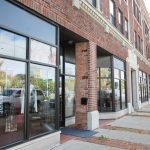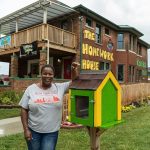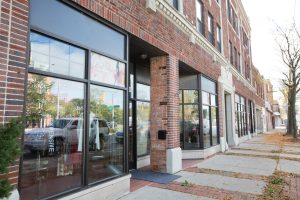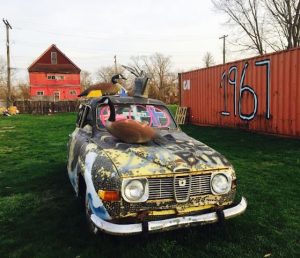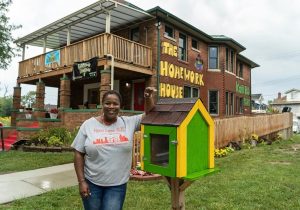Detroit Is THIS is hosted by Ivana Kalafatic, founder of Detroitisit. The show sees thought leaders, community change agents, makers, innovators, and entrepreneurs share their personal and professional stories.
Through these conversations, we’ll explore opportunities and solutions for the times we find ourselves in.
In Episode 1, Ivana talks to Detroit business leader and community maker, CEO of TechTown Ned Staebler about the challenges of the times, the opportunities for small businesses, and the solutions to thinking bigger when we find ourselves facing hardship.
Ned Staebler is VP for Economic Development at Wayne State University and CEO of TechTown. A native of the northwest side of Detroit, Ned was well aware that he grew up during a time of tremendous struggle and change. He left to attend Harvard, then worked in the finance industry after graduating, living in Chicago and London. Two years turned into a decade, with Ned attending graduate school at the London School of Economics, where he studied Comparative Politics and Political Economy. He [finally] moved back to Michigan to give back to his beloved home and got a job at the state’s economic development agency, where he ran capital access programs and other programs for businesses. Now at WSU, he and his team help businesses by doing placemaking, growing talent, and much more all across the city.
Throughout the podcast, the duo details what makes a city, a city, and why Detroit is a hidden gem. The current state of the world is addressed, including Ned missing the energy and socializing at TechTown, as well as what the futures of TechTown and Detroit look like. Pssst! There are lessons to be learned from living through the Detroit bankruptcy!
Key takeaways:
- TechTown partners with neighborhood organizations to promote economic development.
- The restrictions on businesses today breed innovation.
- Businesses need to care about their people, track their cash flow, and seek out additional streams of revenue.
WHAT IS YOUR CONNECTION TO DETROIT?
I grew up on the northwest side of Detroit and went to Detroit Public Schools in the 70s, and 80s. I did go to high school at U of D high over on seven mile. So I didn’t go to DPS all the way through 12th grade. Growing up, it was a time of tremendous change in the city and it was a really interesting place to live and grow up. I always knew that the city was changing, and to some extent struggling. For those of us old enough to remember that time, the auto industry, which obviously fuels to arts degree Detroit was going through the first wave of automation and international competition coming in. That was the last one, I’ll leave the lights on, back in the day. Even then, I saw the changes happening in my neighborhood in my city and I said, man, I want to be a part of helping this to come back.
But I left like a lot of folks do, for college, and I went to Harvard as an undergrad and always planned to come back and do public service. I knew that if I was ever going to have an impact on public policy, I ought to go out and see how the real world works a little bit see the impact that public policy has on people, I wanted to be more connected in that way.
So I went out and got a job and worked for what we would now call it a FinTech where we did algorithm-based trading and proprietary modeling systems and ended up getting bought by a big bank. After I was there for about five I went to London for five years. I woke up one morning and said “oh, man, I was supposed to do this for two years before I went back to public service and figure out how the real world works.” and instead, it’s been a decade and within 3000 miles from home. With the encouragement of my amazing wife, I quit my job and I went back to grad school at the London School of Economics, where I studied comparative politics and political economy. I wrote my dissertation on how states were responding to globalization, called economic development. I finished that up in 2005, moved back to Michigan, and got a job at the state’s economic development agency, where I sort of put the academic and the professional work together.
There, I started off running our capital access programs, focused on how to make sure the small business gets access, through bank capital, or on the tech side angels and venture capitalists or maybe private equity. Then within a couple of years, I was running sort of all the economic development programs for the state, some of them through the 21st Century Jobs Fund, and then others through more traditional mega and Brownfield and Renaissance Zone programs as well.
Then a change administration 2011 rolls around, I got a call from a headhunter, they said, Ellen Gilmore, who’s the president of Wayne State time, wants to talk to you. I didn’t even ask about what. I met Alan, he said, “I want you to do economic development for the university.” I said, “What’s economic development for university?” I remember him saying, “I don’t know, let’s figure it out.” Here I am, nine years later, and, you know, we’ve got an entire economic development group, and tech town as well. So a total of about 6070 people all in helping businesses doing placemaking, growing talent, and doing all sorts of stuff across the city.
WHAT IS IT THAT MAKES UP A CITY THAT IS SO COMPELLING TO FOLKS THAT THEY WANT TO LIVE IN THE CITY?
Cities, in my mind, at least, this is a personal opinion, cities are cool, because they have lots of different “stuff” and people are always trying new things, changing, and you can’t control it. Some of it you hate, and some of it sucks, but some of it is cool, and you never thought that you would like something like that, but you happen to go to it or try it because it was in proximity to you. If you want to get all like academic cities exist to reduce transaction costs, Glaser and Harvard will tell you why the rise of cities happened, right? I mean it but it’s true. I can walk down the street and get four different cuisines and three different types of products and be like, wait, there’s a store to do – what? A unicorn supply shop. What is that? That’s the weird stuff that happens in cities that makes some people get frustrated. If you don’t like it, don’t go to it. It’s a city so people can have their choices.
My favorite thing about Detroit is the hidden gems of Detroit. It is very much an insider city, it is not an easy city. In Detroit, you’ll cruise down an alleyway and turn around a corner and next thing you know, you’re on a beautiful patio where they serve Italian and Mexican food. There are hidden gems, you’ll drive through an abandoned neighborhood and next thing you know, you’re at the Polish Yacht Club. You’re transported back in time. These things that people just don’t know about and it makes you feel kind of like, yeah, I’m cool, I went down that secret alleyway and found something.
WHAT IS IT THAT YOU MISS MOST ABOUT TECHTOWN THESE DAYS?
Personal time since I’m an extrovert is gold that’s what I miss the most. I really do miss the energy, I’ve really missed the creative people that are doing amazing things, whether it’s a really cool technology product, or it’s a nonprofit that is helping school kids, various media outlets that are there covering some of the most important issues of our day, or we’re trying new models. That’s fun for me, that’s what keeps me energized is much like in a city, there’s always something new and different happening. My favorite thing is when I walk through Tech Town and I see a table of three different people from different groups that all happen to work there that are collaborating on something because they happen to have a serendipitous collision in the space and now they’re putting on a conference or helping a client out together or something like that.
BECAUSE YOU ARE A CO-WORKING SPACE WHAT IS THE NEXT STEP FOR TECH TOWN? WHAT DO THE NEXT MONTH, SIX MONTHS OR FIVE YEARS LOOK LIKE?
At the end of February, we knew we had to plan to shut it all down because COVID-19 was coming. Within about a week, less than a week, really, we had a four-phase plan to handle all the different aspects of our business. So our tenants, our members, our clients that we serve our staff, all these different aspects that we had to cover, and the communications plan around it and it allowed us to be ahead of the game.
The March, 1 week in March, we were sending non-essential people home, we would shut the place to visitors by March 11. By March 13 we were ahead of the game, and we’d already figured out how to use zoom by the time some of the other folks on March 16, we’re like, okay, we’re not going to work, right? Which even just a matter of days, now, three days is like six months’ worth of paddling. So we were a couple of years ahead of people by being a few days ahead.
We are putting the same kind of phased plan together for the future. It’ll be phased, and I don’t think the coworking comes back right away. We’re doing a lot of survey work. Just like we teach our businesses customer discovery. We’re doing that right now, you should have gotten a survey from us asking me how you can feel comfortable what, what things you need to see. So we’re putting a plan in place, I don’t think it’ll be co-working, I think people will be able to get back into their offices next month and then we’ll sort of see where the data and the science takes us to how and the comfort level of people coming back in now. That’s the short term, that’s the three to six month period, you’re asking longer term. I am incredibly optimistic because I get to watch everyday technology and science solving problems.
I am incredibly optimistic that we’re going to come up with really good treatments for COVID, for vaccines, we’re going to understand much more about how it spreads, what antibodies mean, and what kind of protection they give. I would say that starting 6-8 months from now, science and technology will be way ahead of where we are now. And we’ll be able to make much more informed decisions about risk and not risk. So I’m confident that by this time next, we’ll be looking back on this like, “Remember when we first figured this thing out? That was crazy.”
WHAT ARE THE LESSONS TO BE LEARNED FROM THE DETROIT BANKRUPTCY FOR WHAT IS HAPPENING NOW IN COVID-19?
Some of them are lessons that are where we can see direct parallels. We’re going to lose some businesses, let’s just be honest. That’s something we’re diligently working on to try and make sure that for the businesses that are not going to make, it that they are responsibly winding down so as not to damage further damage, personal credit, and things like that. That’s the negative one, I would start with the negative the positive thing is that Detroit really does hustle harder, right? The folks that are in Detroit, I mentioned earlier, Detroit is not an easy place to be not, it’s an easy place to live. If the people in Detroit were looking for easy. They would have moved already to Chicago or you know, Philadelphia, I don’t know pick some other city where basic stuff just generally kind of works, right. Yeah. The folks that are in Detroit, are hardy, hardy souls.
So I’m not worrying the least about Detroiters as a whole, but I am worried about individuals. I think my favorite analogy of this whole storm or this whole situation is that we’re not in the same boat. We’re in the same storm, but we’re different boats. Some people have big old cabin cruisers, and some people have dinghies with a leak in it, that’s what I’m worried about.
I think the parallels back to 2009 and 10, in that period afterward is that we are going to strive to survive, we will come out of this stronger than we went into it. It’s not going to be easy. But we thrive on it not being easy. We’re used to that here.
Tune in now and subscribe to Detroit Is THIS where you normally would listen to all your podcasts to learn more about Detroit’s thought leaders, innovators, and entrepreneurs.
Follow us and discover more of our podcasts on:
Facebook https://www.facebook.com/detroitisit/
Twitter @Detroitisit
Instagram @detroitisit
LinkedIn https://www.linkedin.com/company/detroitisit
Apple podcasts @DetroitisitThis
Spotify @DetroitisThis






